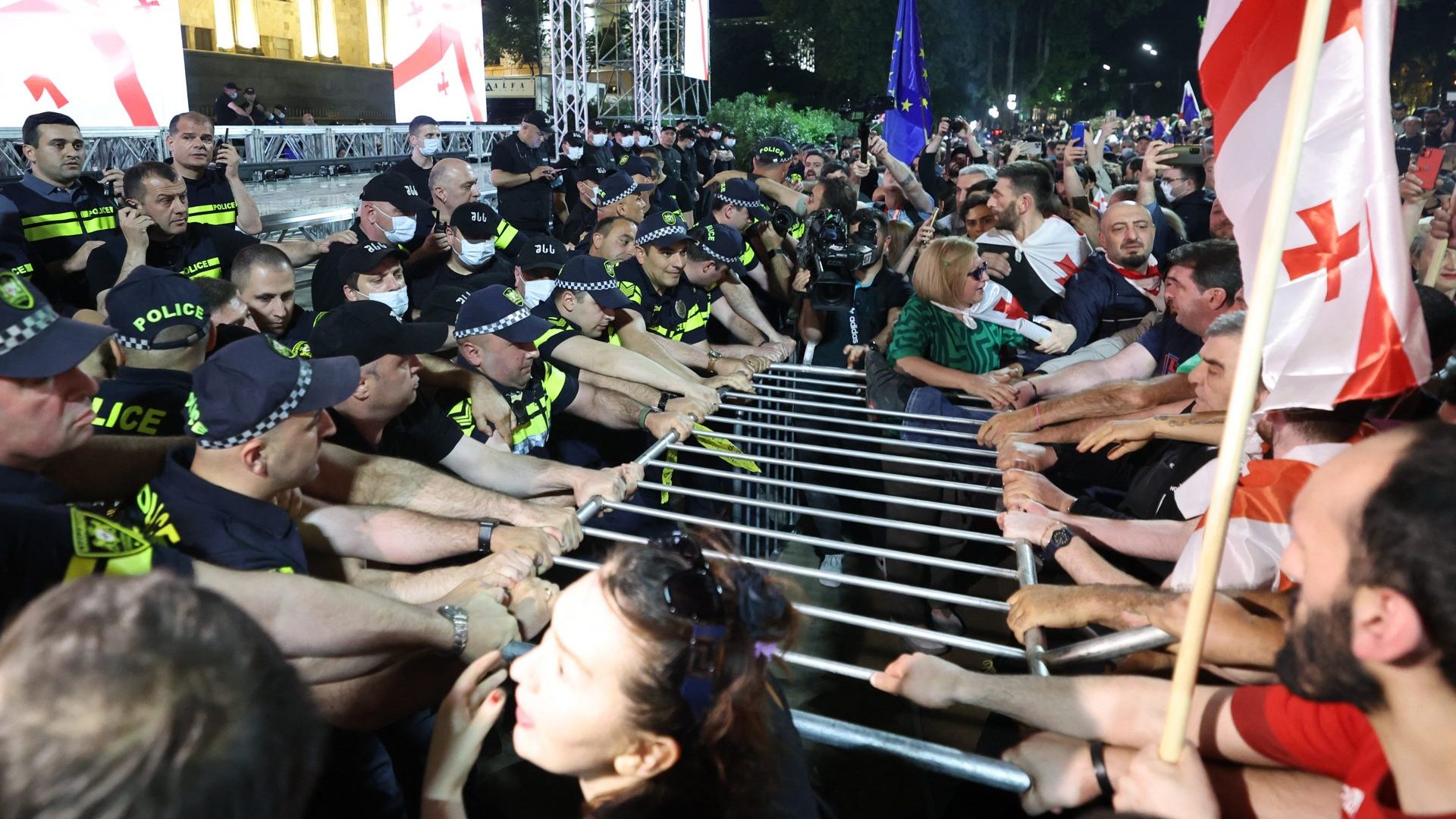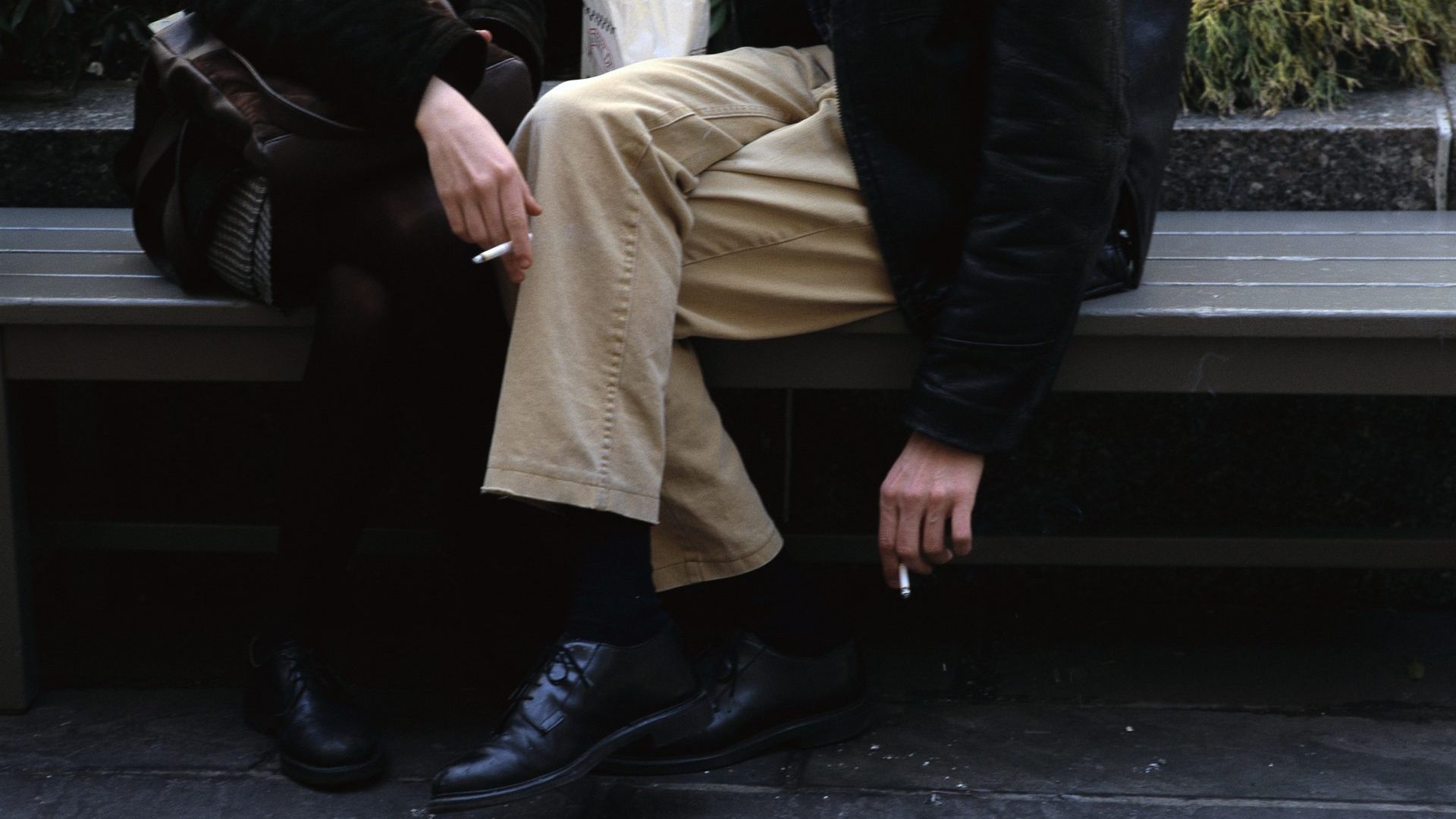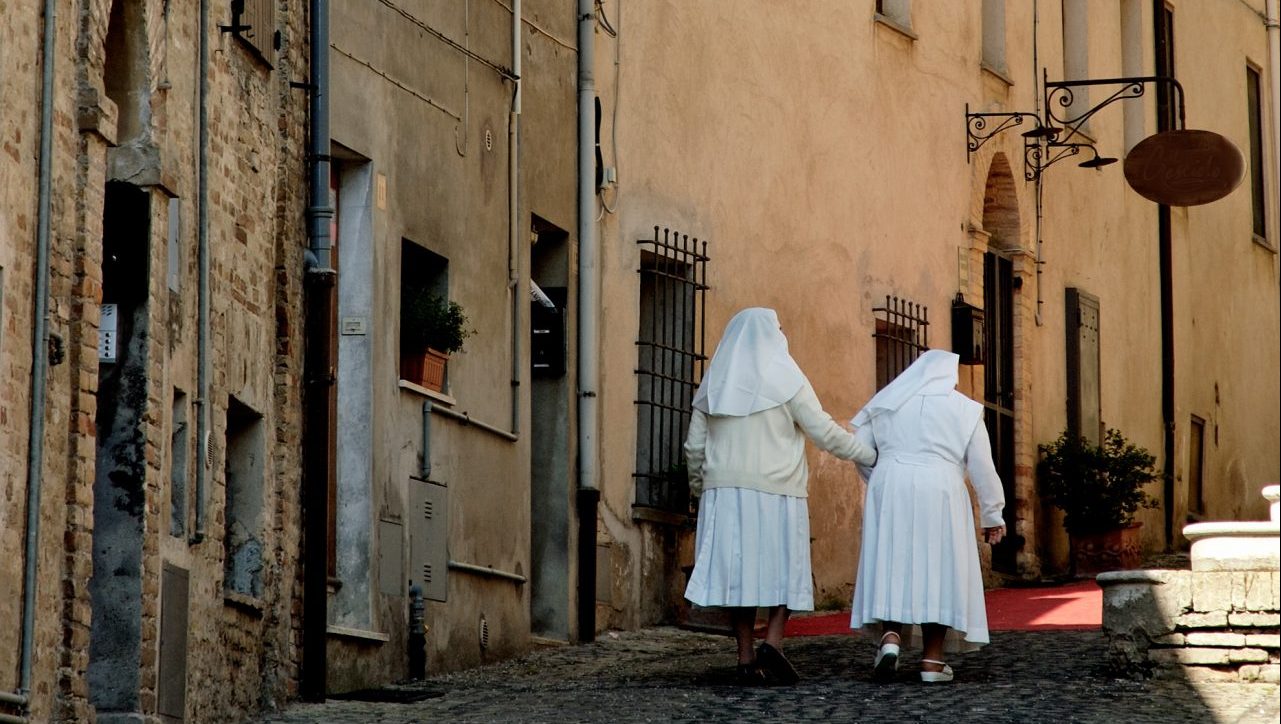Nina Gochitashvili is a student at Ilia State University in Georgia. Every day she packs her floral bag with the necessary items for the demonstration: a respirator (in case of tear gas), sodium chloride to wash out her eyes, and special sunglasses to protect the eyes in case of rubber bullets.
She packs neatly. But then Nina is experienced now.
She has been raided by the authorities numerous times. “Five of my friends were detained on the first night, the others yesterday, I had panic attacks last night, it is not easy – but we should protect our country,” Nina says.
What she and many others are trying to protect their country from is the introduction of so-called “Russian Law”, a set of new restrictions aimed at the independent media and civil society groups. Despite the intense protests in the streets, the legal committee of the Georgian parliament needed barely a minute to vote it all through. It’s close to becoming law.
While MPs were voting in favour of this law, the crowd gathered outside parliament were screaming: “slaves!” Despite the deteriorating security situation, which includes raids on activists’ homes, arrests and assaults against protestors, the people keep demonstrating.
On Monday morning alone, 20 people were arrested, most of them simply for being there. Last weekend, thousands of Georgians marched in protest. They don’t want “Russian Law” – they want membership of the EU.
On Friday Irakli Kobakhidze, the prime minister, said that the new law would be adopted, and that the protesters were all deluded. The evidence in the streets tells a very different story.
When they detained my father, Gia Kikacheishvili, I was not sure if I would ever see him alive again. On that same night I heard that my daughter, Mariam Zedginidze, had been teargassed.
I had no idea where the police had taken my father. Only the next morning I found out that he was in the detention centre in the city of Mtskheta. A journalist I knew, who had spoken to his lawyer, sent me a message: “Unfortunately he’s been beaten”.
My daughter, who is 20, was at the same protest where dad was detained. After she was tear-gassed, she managed to hide in a shelter until sunrise, then walked home. When dad was released after 48 hours, he had injuries to his face, bruises all over his body, and was suffering from concussion. This is what “Russian Law” looks like.
Other, subtler but still sinister methods of intimidation are also being used. In neighbourhoods where activists, experts and journalists live and work, posters have started appearing, identifying the activists and calling them “spies” and “enemies of the people”, a phrase all too familiar from the time of Soviet repression.
Natia Kuprashvili is an activist, media figure and a professor at Tbilisi State University, and it seems that someone has got hold of her phone number. The threatening anonymous calls have been coming from both Georgian and international numbers, by day and night.
Journalists, activists, and citizens – anyone who has spoken out about the threat of “Russian Law”, has been targeted. In some cases, even their children have received threats.
Natia received her first call when she was driving her family in the car. She answered the call on the loudspeaker. It was a man’s voice, she says. Her underage daughter heard everything. The callers threaten physical attacks – they seem to know a lot about Natia, including where she lives.
Most of her students are protesting and so Natia postponed the lectures to demonstrate with them. “I see my students are beaten, attacked, tear-gassed,” she says. Even though the academic staff support her, the university has ignored the fact that one of its lecturers is being threatened, and that its students are being beaten.
Instead of support, a campaign started saying Natia was unfit to teach students. “I don’t feel safe there anymore,” she says.
Natia, along with the journalists Nino Zuriashvili and Nana Biganishvili has lodged an official complaint about attacks on journalists, and particularly the “Enemy of the People” posters.
The British embassy in Tbilisi has also become involved, posting a statement on its Facebook page, urging the Georgian government to clamp down on intimidation, and to investigate all violations against protesters. The statement also expressed support for Georgia’s Euro-Atlantic aspirations.
The new “Russian Law” poses a grave danger to independent media outlets, which would face crushing fines of up to €8,500 a time simply for reporting political news. Small independent outlets won’t be able to afford this – independent reporting would gradually be replaced with government-approved news, just as it has in Russia.
The new laws target not only political activists, but also cultural organisations, for example the Women’s Initiatives Supporting Group (WISG). Nina Gochitashvili used to be involved, specialising in gender and cinematography. “It was shocking for me to see that this organisation was also attacked,” she said.
“They want to deprive Georgian people of their aspiration to join the EU. They want us to live in a regressive Russian-type country, while their children themselves get all the benefits of studying in European or American universities.”
“The ruling party, Georgian Dream, committed political suicide going against the Georgian people – against our long-waited EU aspiration,” Gochitashvili said.
On April 29, the founder of Georgian Dream, the billionaire oligarch Bidzina Ivanishvili, addressed people at a pro-government counter-rally. Ivanishvili was a French citizen when he arrived in Georgia in 2012, and there is no mystery about where he made his money – Russia. He told his supporters, without a trace of irony, “There is no bigger enemy for the state than the pseudo elite, which was brought up by foreign countries.” Ivanishvili, who doesn’t hold any formal position in the government, is the main director of the Georgian Dream party.
The president of Georgia is Salome Zourabichvili, who is explicitly against the new legislation and has said she will veto this law if parliament adopts it. “This law is Russian,” she said. She has also urged the police and authorities not to use the force against the peaceful protestors.
The protestors can’t give up now. They won’t. Across the city, people are offering rooms for those who come in from the regions to protest in Tbilisi. The protest is everywhere. Just a few days ago, one elderly woman who couldn’t even leave the house flew EU and Georgian flags from her balcony.
Georgia might be a small country. But we often say if you were to flatten out all our mountains, we’d be bigger than Russia – and we are not going to give up our hopes of joining the EU.



